Why Should Language Businesses Care About ChatGPT in 2024?
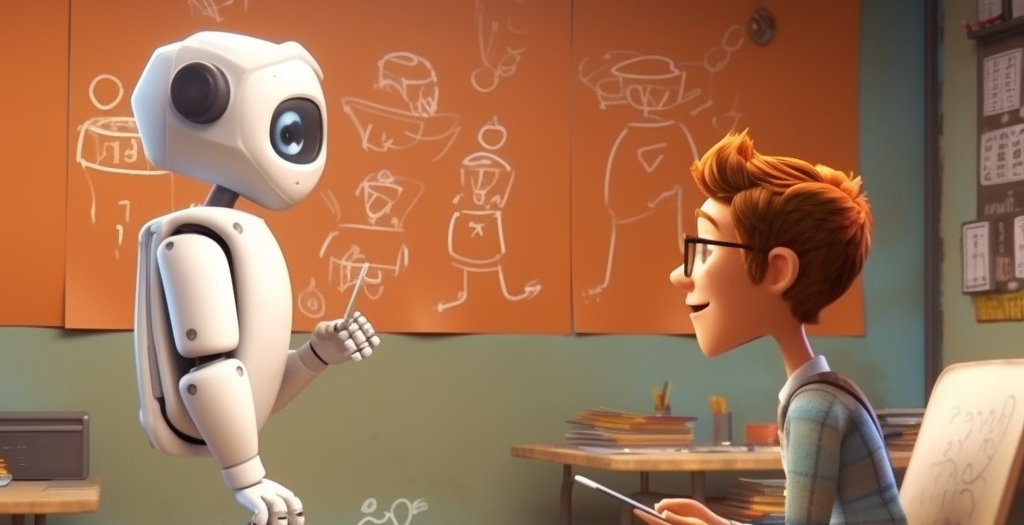
ChatGPT is disrupting the world, particularly the education system. Students are wondering, can I use ChatGPT to tutor me or do my homework? Parents and teachers are wondering, will ChatGPT take my job? Schools, teachers and education businesses are wondering, what next?
In this article we'll cover:
- What is ChatGPT?
- What can ChatGPT do that chatbots couldn't do before?
- Why should education entrepreneurs, teacherpreneurs and educators care about this new AI?
- What are the limitations of ChatGPT?
- ChatGPT raises the standard
- What is the future of ChatGPT and education?
- How will language teacher and language schools be affected?
- Final thoughts
What is ChatGPT?
Users can have almost human-like conversations with ChatGPT on their web or mobile application to solve problems as varied as creating vocab lists, writing essays, designing a computer program, coming up with pop quizzes, and so much more.
While ChatGPT was released to the public only in November 2022, it was the second fastest company in history to reach 100M users and has released several jaw-dropping new capabilities over the last year.
ChatGPT is developed by a for-profit company called OpenAI with backers including Microsoft, Elon Musk and more.
What can ChatGPT do that chatbots couldn't do before?
Firstly, it is incredibly versatile and can do a broad range of tasks. As we discussed in episode 54 of our 'Get More Students' podcast, most chatbots many of us have tried are single purpose in that they do one thing really well.
For example, many companies use chatbots for customer support and normally the user can ask the chatbot anything to do with that company. I had never encountered a chatbot that could create a list, write an essay and generate a piece of homework until I tried ChatGPT.
Secondly, you can "chat" with ChatGPT just like you would chat with a human being either via text or voice.
Normally chatbots are able to mimic a human conversation where you write a prompt (things you ask ChatGPT to do) and the chatbot provides a response/answer. Traditionally, this experience has felt underwhelming, limited, one-dimensional and "transactional".
ChatGPT uses advanced natural language processing so the chat feels so much more natural, fluid and "human". With ChatGPT, you can layer prompts (or chats, questions, requests, etc.).
For example, let's say you wanted to help a student by working through some sample questions for their upcoming IELTS exam. You might start by typing an initial prompt into ChatGPT e.g. "Can you please give an example of an IELTS exam question that tests writing?"
ChatGPT will do this in a matter of seconds.
You could then layer on top of your first prompt and ask ChatGPT to improve its result or provide more examples e.g. "Can you give 3 more but with a theme of football? ChatGPT will then repeat the initial task but improve it based on your second prompt.
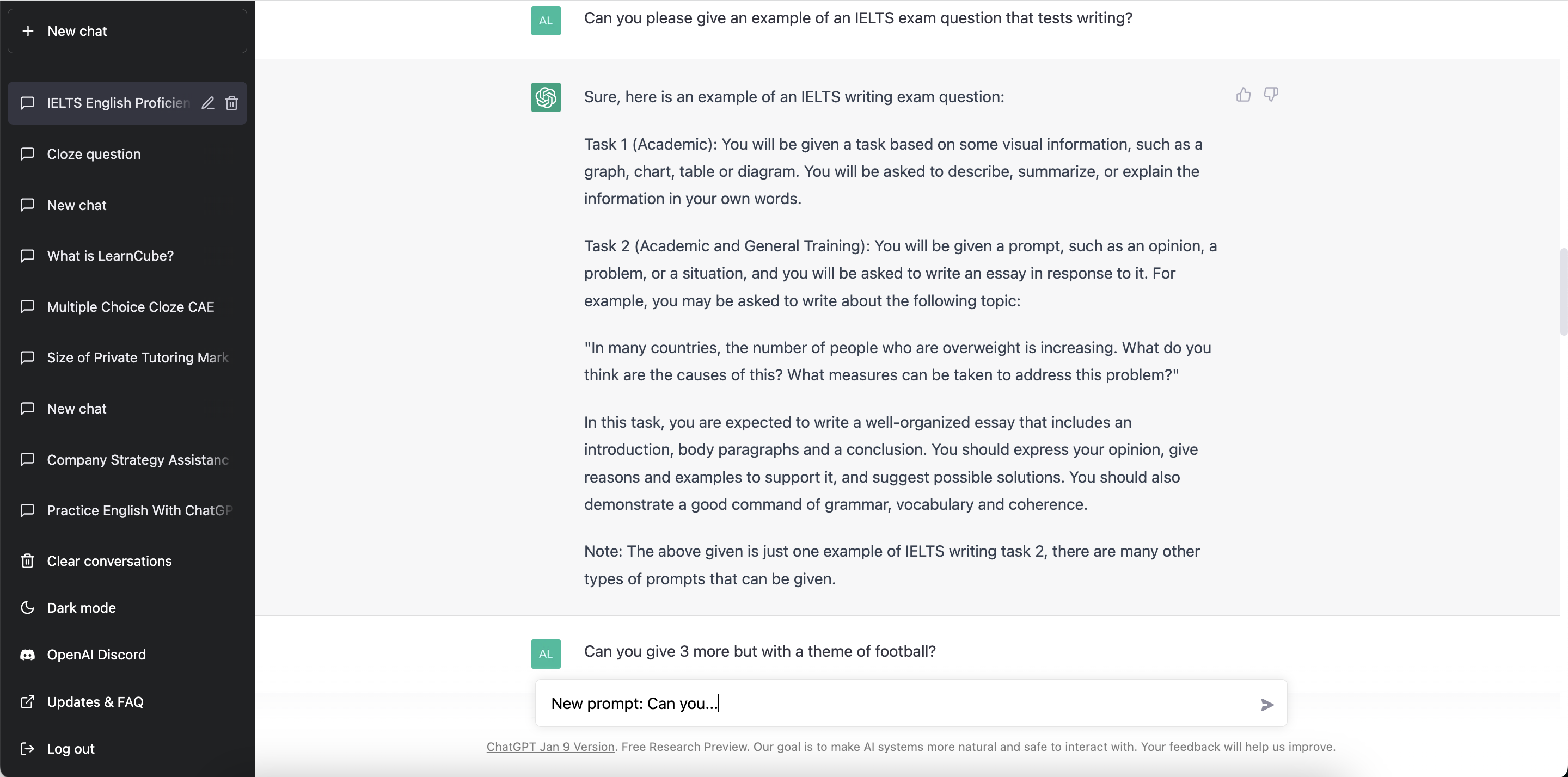
The way the model "remembers" what you've previously asked and improves on its own response is impressive. The fact you can ask ChatGPT to write an essay, an outline, a list, or even write code, is astounding. You can see how helpful and transformative this will be for language education and tutoring.
Aside from ChatGPT competitors, compare this with the next best alternative of Google search where a teacher would have to try numerous search terms, review various websites, find the best templates, come up with the questions... and complete the task. The teacher would have to proofread, check and polish the results from either Google and ChatGPT, but ChatGPT is clearly much faster, easier and more powerful.
Thirdly, ChatGPT is amazingly useful, fast and provides really high-quality results. It's hard to explain the wow moment until you've tried it but the results are just really good, and amazing when using ChatGPT Plus (GPT-4). Most commentators make it clear that the results are often inferior to a human teacher or human worker. However, ChatGPT responses are free, fast, and also often a great starting point that humans can build on to make their own. That may explain its viral growth, attracting one million users in its first week and beating even TikTok's record to one hundred million users.
Note that the ChatGPT, released in November 2022, was using the model GPT-3.5. This has subsequently been superseded by GPT-4 on 14 March 2023. You can see the difference in this companion article here.
Not only that, you can see how fast AI image generation is progressing. This is a row of images generated by OpenAI's DALL-E-2 product in January 2023.

Now check out what Midjourney in June 2023 (just five months later is capable of producing. It's worth noting that now, as of November 2023, DALL-3 has become a lot better.

Why should education entrepreneurs, teacherpreneurs and educators care about this new AI?
Having given a few examples, as an educator, your alarm bells might be sounding.
If a chatbot can write a "pass" grade essay in 5 seconds that is almost indistinguishable from what most average students can write within 5 hours, what is the point in teachers asking students to write essays? Does this rob students of their motivation to learn to write?
If a chatbot can create useful lesson plans and correct homework for free, why would a student pay for an average tutor or teacher to help them?
If a chatbot can mark homework for free, why should teachers be expected to mark homework for free?
If a chatbot can write "good" advertisement copy for your next marketing campaign, why would you pay a person to get the same, or perhaps a worse, result?
This is the big, and scary, point to remember - ChatGPT can take seconds to complete a task that an "average" human worker, teacher or student can do in hours. It can do it for free. It never tires, gets sick or complains.
Some people are already imagining the end of education as we know it, and many feel this technology is threatening their jobs. The pace of change is increasing this concern.
See this quick summary of key dates and releases:
- November 2022 | Open AI launches ChatGPT (available for anyone to try for free)
- January 2023 | ChatGPT reaches 100 million users (record-setting milestone)
- February 2023 | Microsoft integrates ChatGPT into Bing, its search engine
- February 2023 | Google introduces Bard (its AI response to ChatGPT) and Facebook/Meta introduces the LLaMA model (open source to "democratise" access to large language models).
- March 2023 | OpenAI releases GPT-4 and an API (inexpensive & powerful)
- March 2023 | Microsoft announces Co-pilot (infusing AI into all key products)
- March 2023 | Elon Musk, Steve Wozniak, and other tech leaders sign petition to halt the training of AI systems more powerful than GPT-4.
- April 2023 | OpenAI launches AutoGPT (ask ChatGPT to complete tasks for you)
- April 2023 | The list of providers of LLMs grows to include: Anthropic, Google, Nvidia, Amazon, Elon Musk's X.ai, Inflection, Meta, Cohere, Alibaba, plus open source models.
- May 2023 | Anthropic, company developing Claude, expands tokens from 9000 tokens to 100,000 tokens.
- June 2023 | Despite all the hype and conversation about generative AI seemingly on every media channel, still only 14% of US adults have actually tried ChatGPT. (I still think this is a transformational technology but it may take longer than many expected for mass adoption of AI tools)
- June 2023 | EU getting closer to regulating AI. The USA may not agree but just as with GDPR its companies will find it to difficult to sidestep.
- June 2023 | ChatGPT's 'context window', or how much information GPT remembers, increases to 16,000 tokens for GPT-3.5-turbo, four times the previous size. It is also getting 25% cheaper.
- July 2023 | Anthropic releases Clause version 2. This has an increased context window, better performance and is trying to close the gap with ChatGPT.
- July 2023 | OpenAI shuts down its AI detection tool, Decrypt, due to its low rate of accuracy. The fake positive rate is too high and it was not difficult enough for those that wanted, to get around the detector.
- September 2023 | ChatGPT can see, hear, and speak
- November 2023 | OpenAI announces GPT store that enables anyone to create custom AI assistants (GPTs), no coding required.
- May 2024 | OpenAI announces GPT-4o (omni) that can "reason across audio, vision, and text in real time." Could this signal the step change progress in the development of an AI teacher, students want to work with?
Some schools originally tried to ban the technology, or use plagiarism software, to stop students from "cheating" but this is not a technology you can easily ban and students continue to find ways around the ban.
If there is a cheap or free way for students to get out of doing the work, many will find a way to access the technology... and should we blame them? Just as we are no longer expecting students to calculate complex equations in their heads when there is a calculator at hand, should we expect students to write essays better than ChatGPT? This technology is not going away but neither is ChatGPT going to end the need for humans to think, analyse, teach, communicate with or advise others.
After all, humans still combine unique skills, experience and knowledge together in miraculously creative ways. The skills we learn in the classroom remain relevant even if humans focus more on editing, rather than creating, work and still ChatGPT certainly has limitations.
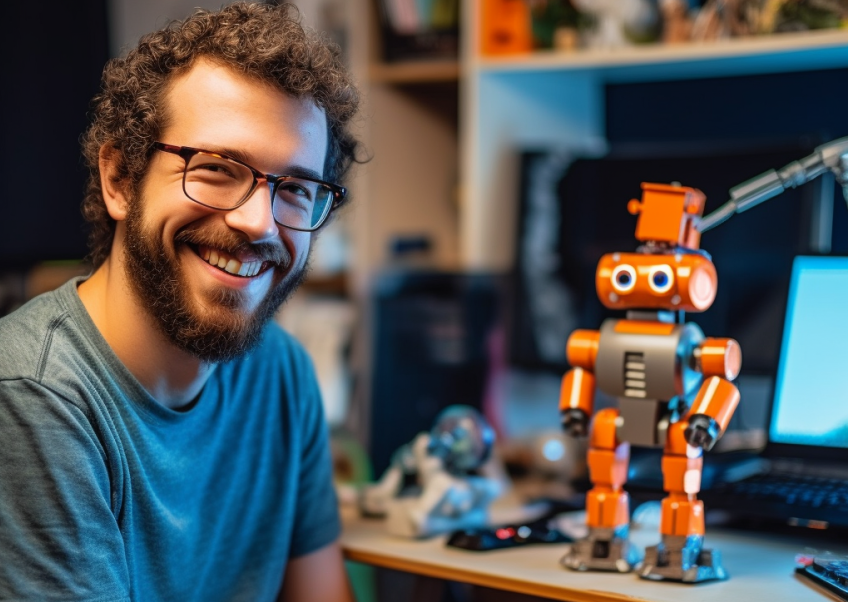
Credit: Images created by MidJourney AI art generator.
What are the limitations of ChatGPT?
The free version of ChatGPT (using GPT-3.5) is slower, occasionally unavailable during peak hours and typically produces inferior results for educators compared to the GPT-4 model.
The tool can "write well, but not excellently" so human input is still very much needed.
ChatGPT "can be easily confused if your prompt starts to become too complicated..." and it is still possible to get nonsense results.
In fact, that remains one of the biggest dangers for ChatGPT users. Not only can the responses from ChatGPT be uninspiring, if not grammatically perfect, but there is still the clear risk of responses being inaccurate, out of date, misleading, incomplete or possibly offensive. ChatGPT works best when a skilled human checks and improves the raw results.
ChatGPT 3.5 has only access to data available up to January 2022 if on the free version. If you were to ask standard ChatGPT about current events, ChatGPT cannot browse the internet and cannot retrieve the most up-to-date information.
However, if using ChatGPT Plus (using GPT-4) the model is trained on data up to April 2023, it is far more powerful, enables access to plugins, is multi-modal (meaning you can use voice to interact with it or upload images, files, etc.), it will "remember" more context, and offer so much more than the free version. The divide between the free and paid, have's and have-nots is increasing exponentially.
ChatGPT raises the standard
While I don't believe ChatGPT can do everything, and humans still have the lead.
However, I do believe ChatGPT can, or soon will, be able to do many tasks better than an "average" human teacher or worker.
ChatGPT can, or will soon, be able to create homework better than an overworked teacher who regurgitates freely sourced homework templates on the internet.
ChatGPT can write better than a lazy student with poor grammar who only has a few hours to research a new topic and write an introductory essay on it. Human students will need to show off their creativity, good judgement and deep analytical skills.
ChatGPT can mark homework better than an overworked teacher who is not usually paid for marking, and that's a good thing. Teachers should focus on communicating and motivating students, rather than mechanically marking student homework.
ChatGPT can write newsletters, blog posts, social media messages, create marketing images and ideas better than the average marketing intern.
Does that mean that there will be no more marketing jobs? Absolutely not. Expert copywriters know their market better than anyone else and can touch on the emotions of humans to get better results than machines.
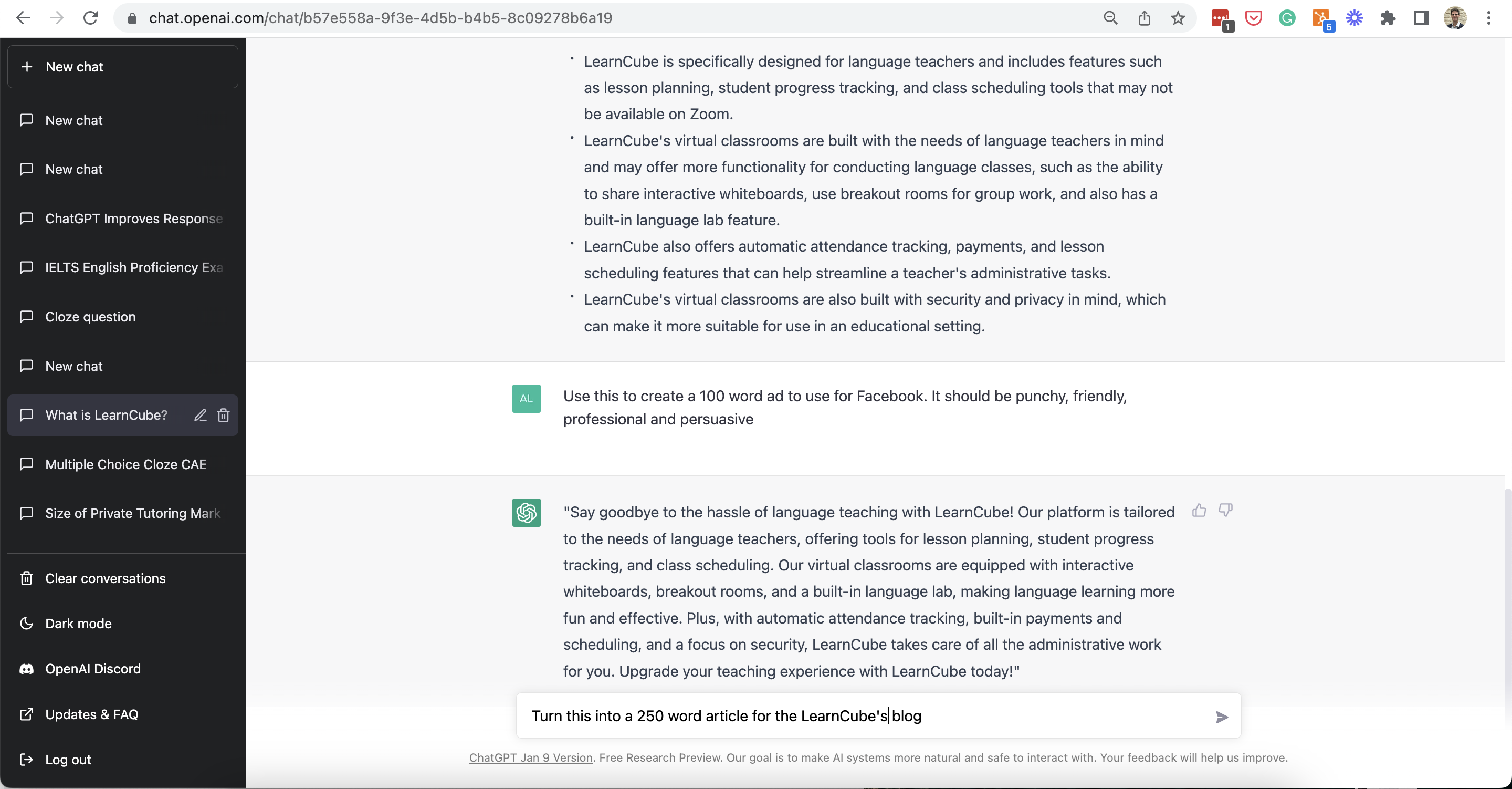
What is the future of ChatGPT and education?
I have heard it said that ChatGPT is as bad as it is ever going to be, meaning that as the technology is capable of "learning" and the pool of users gets bigger, it can only get better, smarter and more versatile.
From my perspective, ChatGPT immediately raises the standard of what we expect humans to do. Human workers, assistants and teachers that do an "average job" may have reason to be concerned. ChatGPT can also do a passable job but is currently free to employ.
ChatGPT immediately forces us to reconsider the current education system and particularly "old school" education systems that place too much importance on standardised examinations and writing skills that AI can now mimic or do better than human beings. No one wants, or needs, an education system that teaches students skills that are, or soon will be, made obsolete by technology.
For years, educators have discussed and agreed on the four most important skills for this century: critical thinking, collaboration, communication, and creativity. These skills will remain valuable even in a future where AI can write essays, understand knowledge, calculate equations, come up with ideas and make art. Are education systems adapting fast enough in anticipation of this future?
Teaching thirty young students in a class is already very challenging. Teachers are already under a lot of pressure from schools, parents, peers and students. Learning to teach fundamentally differently will initially add additional pressure and stress.
However, those teachers who understand and leverage AI to their own advantage will find the future more exciting than scary. AI could save teachers a lot of time by removing many of the tasks that bore or stress teachers from marking homework to personalising lesson plans to filling out reports. Teachers that focus their time on connecting with, inspiring and supporting students will make an even bigger difference and keep their passion for teaching.
Likewise, administrative, management and marketing staff employed by educational institutions and schools will need to quickly raise their game. If AI can complete tasks in seconds, rather than hours, then those that don't employ AI will find it hard to keep up. Similarly to teachers, those who work in education will need to leverage technology and discover what they can contribute and achieve.
While I'm less familiar with general education and higher education, I have been writing a book on the future of language education so am developing my thoughts on how AI will impact language education.

How will language teachers and language schools be affected?
Communication is more than just the words used and the apps or tools we may use to translate or generate them in the future. Life, work and communication are about connection. The connection and relationship between people are almost always stronger when the people involved can speak fluently and naturally, without the assistance or interference of an AI or other technological application.
ChatGPT is not the first chatbot to show promise or be able to translate written text automatically. Translation technology has improved enormously, yet the language learning market continues to grow.
So while I believe there will be unexpected, exciting new ways for students to learn a language, I don't think that technology will ever replace the need to learn how to speak a language for work, love or fun. Students will still use apps, employ teachers and attend physical & online language schools.
Leading language apps are already introducing AI language tutors to generate lesson plans or provide corrections. For example, Duolingo started with "two initial use cases, which are now available to users of the app. The first is a role-playing feature that allows users to interact with an AI-powered persona and carry out various learning-focused tasks...The second GPT-4-enabled feature that’s already been made available is called Explain My Answer."
You can find a number of other education and language companies follow suit:
The execution of these chatbots in terms of the model they use (for example, GPT-4 is seen as a far better tool for AI-tutoring) and the guardrails and UX companies put around the learning experience will make a huge difference.
From my own experience, I'm less convinced that "free" chatbots using GPT-3.5 will be able to compete with paid apps that build on GPT-4 (it's just not as convincing), nor do I think ChatGPT-4 by itself will replace apps or human teachers (they lack the motivational aspects of modern language apps and modern humans).
However, for content creation, I think GPT-3.5 can already help and future versions of GPT are only getting better. Some online language companies are already using ChatGPT to accelerate their content creation. David Phan, Head of Content at Global Exam, is already excited by how the technology can accelerate content creation. I'm hearing the same optimism from other educators who see it as reducing the strain on time-poor teachers and enabling personalised lesson plans, homework and assessment.
How will this impact in-person language schools?
With or without emerging AI, language learners will weigh up the same key benefits and tradeoffs in travelling to learn at a physical language school today: cost, personalisation, location, and convenience. Since the pandemic popularised live online language learning, learners have already had to weigh up these tradeoffs when deciding whether to learn in-person at a school or virtually through an online language school.
At LearnCube, with hundreds of Online School customers, we are not seeing AI massively reducing the demand for in-person or online language schools.
Some teachers worry that AI may be used as an excuse for language school owners to increase class sizes but I'm not convinced by this. Language schools will be under even more pressure to provide a superior experience and differentiate for a chatbot experience. The learning opportunities for students in large classes with a human teacher would be possibly inferior to students studying in real-time with an AI language tutor.
I think it is more likely that ChatGPT will be used to save teachers time so that they can put more time into being present with their students, particularly since software companies, like LearnCube, are already be looking to make ChatGPT features easier to access, particularly through our AI Teacher Assistant.
How will this impact language teachers?
As explained previously, language teachers, like all teachers, will need to level up and offer more value than AI alone can. Language teachers who push their unique personalities, experience and passion for teaching will excel. Teachers that teach and leverage AI technologies to enrich and improve their lessons will do even better.
For example, language teachers now have the ability to create personalised homework in seconds. I'm sure this has been said in different forms before but this is how I see it: Technology won't replace a great teacher, but a great teacher who makes the most of technology is more likely to replace one who does not.
In terms of what skills are taught, language schools are likely to find that less emphasis needs to be placed on learning to write grammatically perfect sentences which AI can excel at, and more emphasis placed on building confidence in speaking and more sophisticated use of language.
Final thoughts
I think there is a reason to think that ChatGPT heralds a new era, perhaps the Artificial Intelligence Age. ChatGPT is versatile, easy to use, fast, consistently completes useful tasks for free and is only going to get better at completing those tasks. This technology forces us to think differently about work and education. My friend Herbert Gerzer and I talk more about this in this recorded webinar.
While there is plenty we could worry about, ChatGPT and advanced AI technology is not going to go away. The "genie" cannot be put back in the box. So now is the time to work out how to leverage AI and stay ahead of the disruption coming.
On that note, if you'd like to learn more about AI, please download our white paper here on "LangTech in the AI Era".
Other resources:
- Riding the Wave: AI Language Tutor Trend Soaring in 2023
- Will Artificial Intelligence Terminate or Transform Homework?
- LangTech book
P.S. This is the first blog post I've written that only uses AI-generated images.
When first trying AI image generation out I was fairly disappointed with the responses using DALL-E-2. I was hoping for a teacher and student to be in the foreground and a robot writing notes in the background but as I experimented more, I improved my prompts and I think the results got a lot better. This was back in February 2023.

I can't believe the staggering improvement in images now generated by MidJourney as of June 2023 (3 months later). It's not hard to imagine image generation becoming almost as good as real photography in the near future with users, like me, getting better at prompting AI and the AI itself getting better. Spot the difference between images generated above and below.
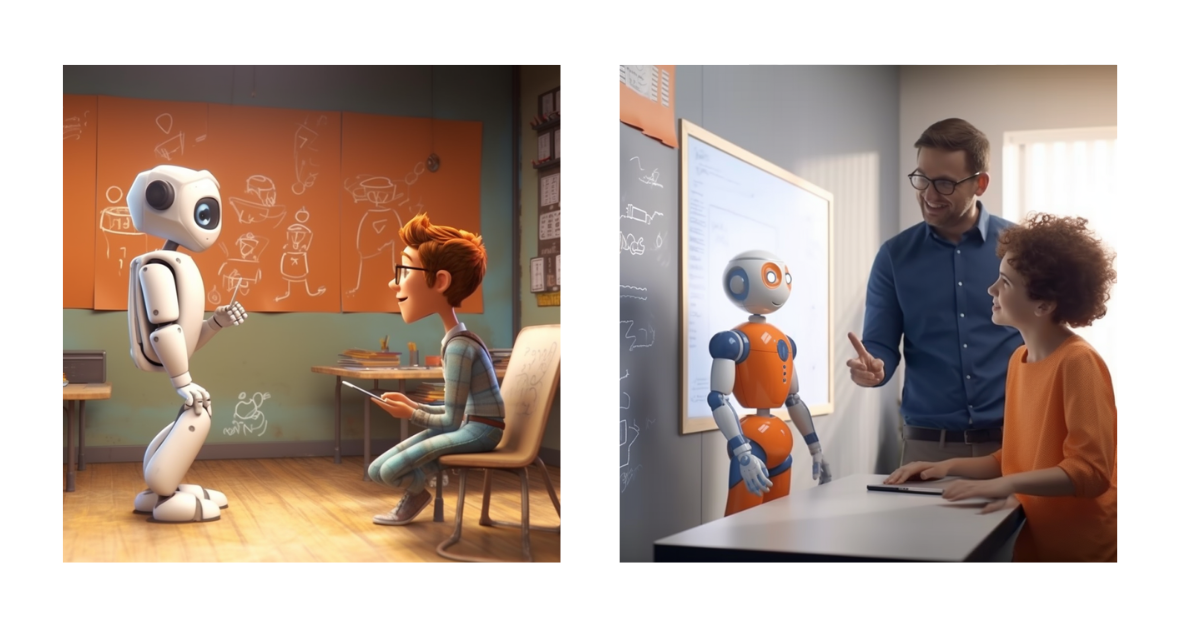
The results are even better now at the end of 2023. You can learn more about AI image generation here.
Popular articles
Be notifed of our new materials!
Ut enim ad minima veniam, quis nostrum exercitationem ullam corporis suscipit laboriosam, nisi ut aliquid ex ea commodi consequatur.
 CEO of LearnCube
CEO of LearnCube